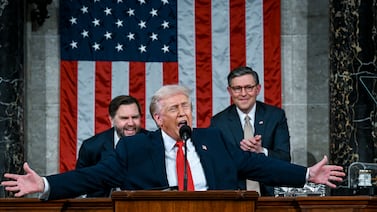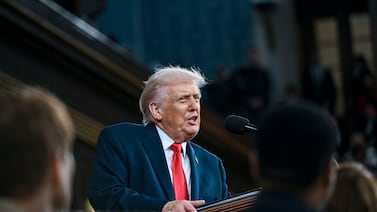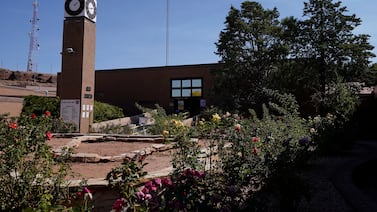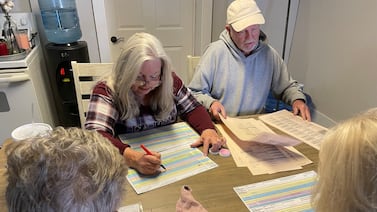Votebeat is a nonprofit news organization reporting on voting access and election administration across the U.S. Sign up for Votebeat Arizona’s free newsletter here.
When Maricopa County Recorder Justin Heap proposed sending mail ballots for a July election to a group of voters who hadn’t requested them, the suggestion seemed to come out of nowhere.
Heap’s plan especially shocked his fellow Republicans, including the county supervisors, who have been clashing with him over election policy and who quickly voted to try to block it. GOP Chairwoman Gina Swoboda told Heap in a letter that his plan would be ill-advised and illegal.
But Heap has defended his plan as a way to avoid disenfranchising rural voters who would otherwise have to drive unreasonably long distances to vote in person.
And there’s some history that helps explain why Heap, who is aligned with the GOP’s arch-conservative Freedom Caucus and who campaigned on a platform of “election integrity,” would suggest such a move.
Some rural voters would face ‘significant drive times’
The July 15 special primary election is being held to replace U.S. Rep. Raúl Grijalva, a Democrat who represented Arizona’s 7th Congressional District until he died in March. At a May 5 supervisors meeting, Heap said that for this election — the first he’s overseeing as recorder — he planned to mail ballots to a small number of rural voters who have not requested them.
About 60,000 of Maricopa County’s voters live in that congressional district, in communities including Avondale, Gila Bend, and areas in between. The majority will have a polling place within a mile or so of their house on Election Day.
But a few dozen voters in the rural southern part of the county live miles away from any city, and face a much longer trip to the nearest polling place. County staff said they needed to find a site for a polling place that fell within the bounds of the congressional district — so as not to confuse nearby voters who live outside the district into thinking that they could vote in this election — and the closest option is about 30 miles away from where these voters live.
That leaves these voters with “significant drive times” for this summer’s election, Sam Stone, Heap’s chief of staff, said at the meeting.
So Heap’s plan was to mail ballots to the 34 voters in this rural area, in the Bullard and Mobile precincts, who aren’t already on the early-voting list.
Past recorder sent unsolicited ballots to rural voters
Stone also told supervisors that the county has in past elections sent out ballots to a small number of rural voters who didn’t request them. And that’s true.
Votebeat confirmed with Helen Purcell, a Republican who was the Maricopa County recorder for decades until 2016, that she used to do this on rare occasions. But there were some important differences in the circumstances, and that was before the enactment of a state law prohibiting it.
Purcell said in a phone interview that this was back when the county restricted voters to casting ballots at their precinct location. Now, Maricopa County voters can vote or drop off a ballot at any polling site in the county.
In cases where there was nowhere within the precinct to have a polling place, and the closest option to co-locate a precinct was far away, Purcell said, she would send the voters a mail ballot. She offered an example of voters who live in Sunflower, which is 30 miles northeast of Fountain Hills.
After Purcell left office, her successor, Adrian Fontes, a Democrat who is now secretary of state, moved to send out ballots to Democratic voters for the party’s 2020 presidential preference election, citing the COVID-19 pandemic. Then-state Attorney General Mark Brnovich, a Republican, sued, and a court blocked Fontes’ plan, saying that state law didn’t explicitly authorize Fontes to do so.
Mailings were banned, without a solution for rural voters
In 2021, after the battle with Fontes, the Republican-dominated Legislature and Republican Gov. Doug Ducey enacted a law that more explicitly says that recorders and election officials cannot mail ballots to voters who do not request one.
So when Heap proposed his plan on May 5, the supervisors immediately questioned its legality, and they voted to exclude the proposal from the overall election plan they approved that day. (It’s unclear whether the supervisors actually had the authority to block Heap’s plan.)
Shortly afterward, County Attorney Rachel Mitchell, also a Republican, sent Heap a letter confirming that the plan would have been illegal.
Heap posted a long statement on social media explaining his position. He said that without his plan, the supervisors would “disenfranchise dozens of rural Maricopa County voters” by leaving them with no reasonable access to a polling location.
“For decades the Board has never raised an objection to this approach; however, they now use it to gaslight the public in a juvenile attempt to score cheap political points and create chaos,” Heap wrote.
He said his office would soon notify the rural voters that there won’t be a polling location near their precinct, and advise them that they can receive a ballot in the mail if they request it.
While most of the county supervisors seemed concerned about Heap’s initial plan, the lone Democrat on the board, Steve Gallardo, said he supported expanded voting options and was worried about rural voters’ access to the ballot box in the future. Officials need to come up with a plan to support such voters, he said.
“This is not going to be the last time we come across that situation,” Gallardo said.
Jen Fifield is a reporter for Votebeat based in Arizona. Contact Jen at jfifield@votebeat.org.





